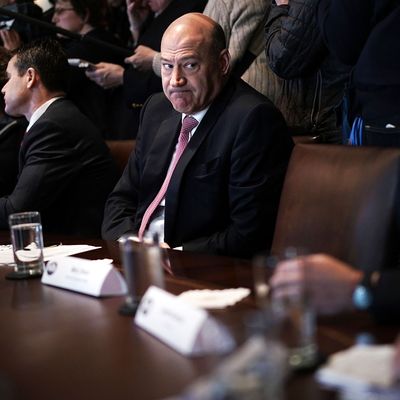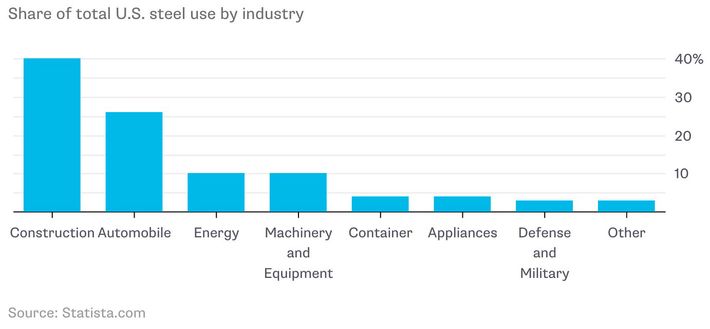
The stock market is a terrible proxy for an economy’s well-being. Corporate America’s conventional wisdom is not the revealed truth of the market gods. Multinational corporations and the median American worker have very different interests — and the former’s support for “free trade” is no less fickle and contingent on narrow self-interest than the latter’s is: Apple may want to build its electronics from the cheapest possible commodities, but it will fight like hell to retain the protectionist patents that inflate its profit margins at the consumer’s expense.
All of which is to say: In some parallel universe, the news that the president has decided to disregard the stock market’s feedback, buck corporate America’s common sense on trade policy, and oust the White House’s most influential voice of Wall Street wisdom might be cause for celebration, not trepidation.
But in that universe, Donald Trump is not the president.
Our populist president has displayed little interest in evidence-based policy-making, or respect for expertise and scientific research. But, until recently, he did make policy with an eye toward one external indicator of the nation’s general well-being: the performance of the stock market. That is, again, a terrible metric; but at least it’s a measure independent of the president’s subjectivity, and one that has some correlation with economic health. Similarly, corporate America’s consensus on any given policy is a poor yardstick for said policy’s merit. But the business community, as a whole, still has more interests in common with the public than does any given ideologue or kleptocrat on the White House staff.
A president whose actions were guided by a singular desire to please the stock market and corporate America would do a lot of damage to this country. But one whose actions are guided entirely by his own baseless intuitions, obsession with his personal image, and mercenary interests (and/or those of his staff) could prove even more destructive.
And make no mistake: Trump’s break with corporate America in recent days is rooted in baseless intuitions and branding concerns — not a coherent ideological disagreement.
When Gary Cohn leaked word of his pending resignation on Tuesday — less than a week after Trump impulsively announced tariffs on steel and aluminum imports — the economic adviser’s departure was framed as a triumph for “economic nationalism” over “globalism.” And there’s obviously something to that interpretation.
Cohn was among the administration’s leading advocates for moderation on trade and immigration. He’d fought for months to prevent Trump from imposing steep tariffs on steel and aluminum; trade adviser Peter Navarro and Commerce Secretary Wilbur Ross took the opposite side of that argument — and prevailed. Now, as America hurtles toward a trade war with its closest allies, self-styled economic nationalists will have an even larger share of the (highly impressionable) president’s attention.
And yet, this frame lends Trump’s “nationalist” trade policies a degree of ideological coherence that they do not deserve. Cohn may well be a globalist; Navarro, a protectionist. But the president is, first and foremost, a fantasist — one who cares more about projecting the image of himself as an economic nationalist than about implementing policies that benefit American exporters.
Trump’s indifference to the actual consequences of his trade policies were reflected in one of the first decisions he made in the wake of Cohn’s resignation: canceling a meeting with the executives of American companies that will be hurt by his tariffs on steel and aluminum, which Cohn had worked to set up.
One can imagine a world where the White House is riven by an internal debate over whether it’s worthwhile to accept slightly higher consumer prices in the U.S. for the sake of fortifying America’s industrial base. But that isn’t actually the debate that’s currently playing out at 1600 Pennsylvania Avenue. Trump has not signed onto a carefully-thought-out, comprehensive plan to bolster domestic manufacturing; he’s impulsively announced a scheme to aid two domestic industries (including one that his Commerce secretary just happens to have ties to) in a manner that will put a much larger number of domestic industries at a competitive disadvantage.
Fewer than 150,000 Americans work in the steel industry. More than 950,000 work in motor-vehicle and auto-parts manufacturing. A policy that imposes tariffs on steel imports — but not on imported vehicles — aids a minor American industry at the expense of a major one. The president is about to incentivize car makers to relocate production outside of America’s borders, by making one of their product’s core inputs cheaper in Windsor, Ontario, than in Detroit, Michigan. And the metal tariffs would inflict similar hardships on other manufacturing industries, while sharply raising costs for the nation’s construction industry — thereby increasing the obstacles to commercial development.

Gary Cohn probably opposes protecting American manufacturing through tariffs on principle. But that’s irrelevant to the internal debate over steel tariffs — because the steel tariffs that Trump has proposed would hurt American manufacturing. Thus, Cohn knew he didn’t need to convert Trump to the neoliberal faith. He wasn’t trying to get the president to meet with Cato Institute economists, but rather, with representatives from the domestic manufacturers he claims to champion. But Trump (apparently) had no interest in finding out how his chosen policy might undermine its ostensible goal.
Which makes sense: The president’s public remarks on trade do not evince much intellectual curiosity about the substance of the issue. The man gets the actual size of America’s trade deficit wrong virtually every time he cites it; claims that our country has a massive trade deficit with Canada, when we actually run a trade surplus with our neighbors to the north; and doesn’t seem to understand what a trade deficit even signifies, or what a “trade war” actually involves.
It is true that Trump has expressed protectionist intuitions for the entirety of his time in public life. But this does not mean that there is any great depth or sincerity to his protectionist ideas, which aren’t rooted in any personal experience with the ravages of deindustrialization — or intellectual engagement with the subject of international trade — but only a faith in the zero-sum nature of all economic exchange (if not all human relationships).
And, by all appearances, Trump’s decision to pursue his current protectionist policy was motivated more by a desire to stay true to his brand — and project a fitting image to his core constituency — than to realize any substantive goal. Observe Axios’s rendering of the decisive Oval Office meeting:
Cohn tried to argue that these tariffs would ruin Trump’s record-setting stock market streak and wipe away benefits of tax reform. But Trump kept saying Cohn was a “globalist” while he himself was an economic nationalist.
…N avarro argued that Trump needed to protect the domestic industry, promote American jobs and show the world we were going to be tough on trade and this was the best way to do it. [Former White House Staff Secretary Rob] Porter argued tariffs would hurt the manufacturing industries that use steel and aluminum as inputs, tax American consumers, roil global markets, alienate allies and lead to retaliation.
Trump sat and watched the fight. He occasionally interjected, saying things like “I need to take care of my base,” “You can’t have a country without steel,” and “Peter, what do you say to that argument?” By the end, Trump told Porter he didn’t realize he was such a “globalist.”
In this account, Trump’s primary concerns are about identity and branding — can he reconcile this or that argument with his persona as an “economic nationalist,” or is the contention simply too “globalist” for him to adopt. The fact that one of the “globalist” arguments here was that the tariffs will hurt American manufacturing doesn’t appear to have troubled Trump in the slightest.
And this is what makes Gary Cohn’s departure ominous: He tethered Trump to an empirical worldview — a myopic and classist empirical worldview — but nonetheless, one that valued rational decision-making, economic growth, and international stability.
If the president continues down his current path — toward trade war and away from Establishment reason — he will have to convince himself that the S&P 500 is just another purveyor of “fake news,” and that the Chamber of Commerce is just a pack of self-interested globalists. From a different kind of populist, such sentiments might sound like righteous truth-telling; from this one, they’d sound like a ticking time bomb.






























